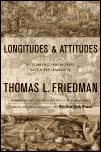|
|
BOOK REVIEW
September
11 and the American Journo
By Sreeram Chaulia
A Review of "Longitudes and
Attitudes. Exploring the World After September 11"
by Thomas Friedman

The
problem with multiple Pulitzer prizewinner and foreign affairs columnist
of the New York Times, Thomas Friedman, is not his lack of articulation,
but the fact that he wears far too much patriotism on his sleeve, and
boasts about it. His views intersect (sometimes even presage) the American
establishment's own thinking, a fact well illustrated by journalist Robert
Fisk's comment that the lay observer need not ache for top-secret
intelligence on whether and when America will start war in Iraq, because
reading the New York Times is enough to know what the Bush team is
planning.
Friedman is a "liberal" in the American sense of the word, but an
old-fashioned "conservative" in the European sense. He gloats that America
is the "Michael Jordan of geopolitics", the Middle Kingdom, and the most
valuable player whose status and hegemony must be preserved for the good
of the world. A fortiori, he champions globalization as a force for
good since it is the mechanism through which American products,
technologies, values, ideas, movies and foods are distributed, and
American dominance perpetuated. His disdain for "anti-Americanism" is
intense, occasionally veering so much to the right that the tag "liberal"
does not always fit him.
It is owing to such attributes that Friedman makes important reading. He
represents the hard core of Americanism and its much-hyped virtues. One
may disagree with him, but it is important to see what the resident
foreign policy pundit of the most important newspaper of the most powerful
country in the world has to say. September 11 is to Friedman "a supremely
American moment" and the advent of "World War III" (p295). Can there be a
better lens to look at its ramifications for American policymakers than
from the eyes of the leading opinion-making journalist? Friedman's
favorite tune is the George W Bush song - how utterly evil and despicable
Saddam Hussein is and how the Iraqi people must be "liberated". Sometimes,
he even writes open letters on behalf of "President Bush" to the Arab
League, Ariel Sharon, Yasser Arafat and Osama bin Laden. He has to be
read.
In the prologue, Friedman threshes out his "super story", the canvas and
generic background upon which September 11 unveiled to him. He calls it
the "new international system of globalization". For all its benefits to
America, it has been proven by September 11 that globalization "can be an
incredible force-multiplier for individuals unmediated by a state". (p5)
Osama bin Laden, Mohammed Atta, Zacarias Moussaoui and many others who
plotted the terrorist strikes are "super-empowered angry men" who utilized
satellite phones, encrypted e-mails and the Internet to maximize the
material and psychological impact of their horrific acts. New Age
technology gives them the leverage to reach around the world and wreak
havoc thousands of miles away.
The first part of the book is a compilation of Friedman's pre-September 11
columns in the New York Times, starting from January 2001. His
preoccupation is with the Arab-Israeli conflict, especially as he
considers himself an "orthodox Jew". He bemoans the one-point agenda of
"who rules Palestine" and asks Arab countries to launch intifadas
for education, free press and democracy. Indeed, as the recent United
Nations Development Program report on Arab human development has
highlighted, corrupt and authoritarian Arab rulers have used Palestine as
a propaganda deviation from their domestic economic and social maladies.
Friedman's number-one hate figure is Yasser Arafat, whom he accuses of
radicalizing Palestinians with guns when what they need most is global
investment and jobs. Arafat is held responsible for the failure of the
"Clinton peace plan" that promised Palestinians 95 percent of the West
Bank and Gaza, besides condominium in Jerusalem city. Oddly, he does not
consider the plight of the 3 million Palestinian refugees, who have a
right to return, and due to whom Arafat turned down that plan as
incomplete.
One interesting realist trait that Friedman's pre-September 11 columns
show is his impatience at the nanny image that the US projects. FBI hounds
and American marines "retreated" in June 2001 from Yemen, Jordan and
Bahrain on warnings of terror attacks, sending a message of softness to
terrorists. Friedman asks rhetorically, "Is this a superpower"? American
"weakness" after the Beirut bombings of 1985 and the Khobar tower attacks
in Saudi Arabia (1996) are further assurances to terrorists of a soft
American underbelly, according to Friedman. He advises "Rummy" (Donald
Rumsfeld) not to waste time building missile defense shields. Instead, the
US must show "real deterrence" and overwhelming military might without
getting cowed down by terrorist threats.
The post-September 11 columns are devoted mostly to a critique of Muslim
states and leaders who failed to openly condemn suicide terrorism and
support a "fascist dictator" called Saddam Hussein. Friedman employs
classic Cold War jargon by asking Bush to "strengthen the good guys" (read
Pakistan, Jordan etc) in the war against terrorism, but not spare the "bad
guys" like Saudi Arabia, Iraq and Egypt which are refusing to do any
self-introspection and laying all the blame on Jewish conspiracies in the
belief that America is controlled by Jews. "Barely legitimate Arab leaders
have deliberately deflected domestic criticism of themselves onto us."
(p.57) If a 10th grade textbook taught in Saudi public schools says, "it
is compulsory for the Muslims to be loyal to each other and to consider
the infidels their enemies", the House of Saud is "not really on our
side". (p.90)
Friedman wants Muslim rulers to acknowledge that the hijackers of
September 11 are their "own creations" and move out of the "blame-others
mode forever". He is appalled during travels to Pakistan where everyone
asks for "proof" that Osama bin Laden masterminded the terrorist attacks,
noting gravely wall posters in Peshawar reading: "Call this phone number
if you want to join the jihad against America." (p.100) "Bin Ladenism" is
flourishing thanks to the failure of Muslim societies to look inwards at
the problems festering in their own backyards. Large Muslim communities in
Indonesia or India are not as dangerous threats to America since they are
"messy but loud democracies" that provide political voice and re-examine
Koranic texts in modern contexts. Arab dictatorships, on the other hand,
are recipes for jihad." (p.101)
On the domestic front, Friedman exults in a wave of nationalism that
followed September 11. "What a great country," he marvels at his
motherland, and proclaims that "Americans will fight for their country and
they will die for their country". (p.61) Hearing the American national
anthem is a "moving and soothing experience" to him ever since the
terrorist attacks. He reiterates that terrorists did not know the
animating vision of America in the world, which is "promotion of freedom -
freedom of speech, freedom of religion, freedom of markets and freedom of
politics". (p.70) He laments the lack of world support for American
actions: "My fellow Americans, except for the good old Brits, we are all
alone." (p.86) On world media concern for civilian casualties in the
Afghan war, he has nothing but contempt. All that questions American
militarism is "nonsense". The careful liberal also defends Attorney
General John Ashcroft's military courts and Draconian surveillance laws as
"not completely crazy". (p.119)
To round up the encomiums, Friedman avers, "I have nothing but respect for
the way President Bush has conducted this war." Bush is credited with
showing "steely resolve, imagination, leadership and creativity" (a highly
questionable tribute, as Bob Woodward's new book Bush at War spills
the beans). If the United Nations is against war in Iraq, it should not
matter to the president, as "we should start by planning to do it alone".
(p.135) Friedman wants more displays of "incredible power" that America
showcased in Afghanistan as a deterrent to future terrorism. On the axis
of evil speech, Friedman confesses that for all its demerits, "I'm still
glad President Bush said what he said" because "we have to be as crazy as
some of our enemies" to win the war. (p.178)
The author frets about the growing "cultural-political-psychological chasm
between us and the Muslim world". (p.161) America is projected as a crass,
materialistic country lacking morals by Arab satellite and radio stations.
The US must make a big investment in "public diplomacy" in the Muslim
world to vigorously challenge the bigoted views of the West circulated by
mullahs. Tabloid Arab media, which show one-sided telecasts of Israelis
brutalizing Palestinians, have to be countered to prevent anti-American
rage from consolidating. There is also an obvious defect in Islamic
radicalism, compared to other forms of fundamentalism. "Why is it that
only Muslims react to our bad policies with suicidal terrorism, not
Mexicans or Chinese?" (p.197) A lot of people in this world are desperate,
"yet they have not gone around strapping dynamite to themselves". Friedman
finds an antidote to Wahhabi Islamism in Iranian reformists, who have now
captured world attention through Hashem Aghajeri. Even Ayatollah Ali
Khamenei is no longer opposed to Iran having diplomatic relations with
America, seeing how young Iranians "react against an anti-American
theocracy" and rebuke mullahs for imposing dress codes and conservative
lifestyles on them. Iranian officials complain to Friedman that Bush is
rewarding them with hostility for all the help they rendered in the Afghan
war against the Taliban and despite the fact that "Iran has the most
democracy and the freest press of any Muslim country". (p.283) Iran's
climate of Islamic reformation that seeks to separate mosque from state
has to be nourished, no matter how deeply the Iranian state and
intelligence are involved in aiding al-Qaeda activities. Saudi Arabia, the
most important Muslim country, is "essential to the solution", and
Friedman suggests that Prince Abdullah should follow the reform model of
his biggest strategic rival, Iran.
The third part of the book is an unpublished travel diary that Friedman
maintained on several visits to the Islamic world since September 11. Just
after the mega-terror events, he is in Jerusalem reflecting "the America I
had grown up in would never quite be the same for my two daughters".
(p.298) He takes pot shots at the culture of denial of responsibility and
conspiracy theories that have weakened the social fabric of Muslim
societies. No progress can be attained by a people "who want to blame
others for all their troubles because they cannot face looking at
themselves". (p.311) Friedman narrates the story of a Pakistani friend
whose infant son is reprimanded in class for challenging the canard that
4,000 Jews were warned not to go to work in the World Trade Center on
September 11. Not a single American flight to Afghanistan flies today
which is not shot by tracer bullets from inside Pakistan by jihadis. Will
the friend's son one day join those snipers?
Longitudes and Attitudes is informative in parts, especially the
view that dark corners in Islamic societies require lighting through self
initiative. But Friedman's biases and intense Americanism combine to
bypass the same degree of self-reflection on America's own foreign policy.
He is "liberal" enough to accept that "we do bad things and prop up bad
dictators", but never once in the book does he elucidate on that.
If you are looking for a celebration of all things American or a crash
course in eloquent op-ed writing, don't look beyond Thomas Friedman. But
don't expect to read any honest analysis of American shenanigans.
[Longitudes and Attitudes. Exploring the World After September 11
by Thomas Friedman, Farrar, Straus Giroux, New York, 2002. ISBN:
0-374-19066-6. Price US$26, 383 pages.]
[Sreeram
Sundar Chaulia studied History at St.Stephen’s College, Delhi, and took
a Second BA in Modern History at University College, Oxford. He
researched the BJP’s foreign policy at the London School of Economics
and is currently analyzing the impact of conflict on Afghan refugees at
the Maxwell School of Citizenship, Syracuse, NY.]
|


